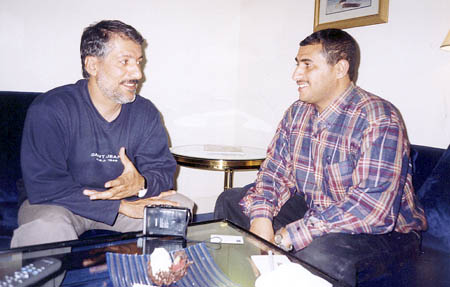Incomplete Partnership [Archives:2001/32/Law & Diplomacy]
Mohammed Al-Ghubari
Excluding tribal sheikhs and the compliments exchanged between Yemeni and Saudi officials during the meetings of the Yemeni-Saudi Higher Coordination Council, nothing new has taken place on the thawing of relation between the two states, which have experienced their worst days since the eruption of the second Gulf war.
The situation of the ailing King of Saudi Arabia has contributed to the stance of Riyadh with regard to its foreign relations. Obviously, there are many influential power centers in Riyadh which determine Saudi foreign policy, due to the absence of any equilibrium within the Saudi leadership.
The most important thing in this regard is the Saudi influence on Yemen, which has existed for a long time indeed. This influence has cast a shadow on Yemeni-Saudi relations for the last three decades. Exactly one year has passed since the signing of a border treaty between the two states, which appears to have failed to influence the Yemeni leadership owing to mutual distrust. Similarly the economic, political, and social progress Yemen strives for through its rapprochement with the Kingdom of Saudi Arabia are now being transferred from the individual level to encompass the nation at large, with the aim of creating a common national ideal which is favorable to this rapprochement.
Yemeni officials can not hide their resentment and indignation at the stance of the Saudi Second Deputy Prime Minister, Minister of Defense, Princess Sultan Ben Abdulaziz who keeps a close eye on a special task-force committee which he directly supervises. This committee is considered to be a significant factor in the Yemeni-Saudi conflict over the last three decades. The committee grants certain influential Yemeni tribal sheikhs and even some government officials large sums of money.
Such a situation may have been justifiable before the signing of the border treaty in June, 2000 but continuing with it now causes real concern over its actual intention, particularly given that Saudi officials have refused to continue offering grants and assistance to Yemen as they previously did before the Gulf crisis. So, a question presents itself: why does Saudi Arabia insist on following the same policy in continuing to pay tribal sheikhs while adopting a new one with regard to financial aid.
If Saudi officials intend to change the means for supporting Yemen on the pretext that the economic situation in the Kingdom of Saudi Arabia has changed then it should channel the millions of Saudi Riyals to the project of developing Yemen instead of to the country’s tribal sheihks.
——
[archive-e:32-v:2001-y:2001-d:2001-08-06-p:./2001/iss32/l&d.htm]


